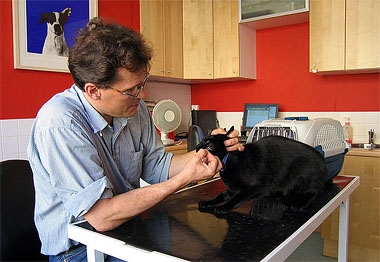
Veterinary surgeon at work, removing stitches following minor surgery on an abscess on cat's face. Photograph © Andrew Dunn, 11 July 2005.
Veterinarians Removed From Skills Shortlist
 12 years ago
12 years ago  3312 views
3312 views
Posted
18th May, 2012 14h16
The Migration Advisory Committee (MAC) is an independent body employed by the UK Border Agency of the Home Office. Its charge is to draw up a list of occupations where the recruitment of a migrant workforce might remedy a labour shortfall. This list of professions is utilised in Tier 2 of the points based system relating to the immigration of workers from outside the European Economic Area (EEA). Veterinary surgeons have been included in the Tier 2 list since the inception of the points based system in 2008.
At the time, the Royal College of Veterinary Surgeons (RCVS) president Jill Nute said, ‘we welcome the recommendation from the MAC. It is reassuring that the profession is likely to continue to benefit from the skills of overseas qualified veterinary surgeons.’ In September of 2011, MAC announced a review of the list, in particular, the removal of certain occupations in a bid to control the number of non EU workers. Along with several other key professions, they proposed the deletion of Veterinary surgeons from the occupational shortage list.
The British Veterinary Association (BVA) immediately contacted MAC in order to raise issues voiced by their members. The BVA expressed its concerns over restrictive border controls, particularly in reducing UK access to a vast pool of highly skilled individuals resident in South Africa, New Zealand and Australia. Traditionally, the UK has benefited greatly from the immigration of these professionals, swelling the ranks of an insufficient home grown workforce. In fact, in previous years, the RCVS reported that on average 55% of its new registrations were from non UK graduates.
Language barrier
The BVA were quick to predict problems arising from a reduction in access to English speaking practitioners. Over three quarters of Veterinary surgeons working in a veterinary practice deal with small animals, i.e. pets owned by the general public. Those working with Beef and Dairy cattle account for 3 and 5% respectively. It seems unnecessary to further complicate what can prove to be an emotive issue for both farmer and pet owner with a language barrier. Effective communication in any industry of care is paramount, particularly in subjects outside the layman’s sphere of experience. It certainly deconstructs our stereotypical image of the country vet insuring his 4x4 and doing the rounds from farm to farm across the countryside.
Unfortunately, the RCVS is in the same position as the General Medical Council: it is not legally allowed to blanket test the language skills of European qualified vets. The lingual skills of prospective Veterinary surgeons are only presumed from their attendance on an RCVS accredited training programme. However, the EU directive preventing this testing is itself currently under review by the European Commission and the RCVS is gathering data in order to make its submission.
Within the EEA the RCVS is legally required to register any individual whose circumstances give them European Community Rights and has a qualification listed in the European Directive. This means that an accreditation allowing an individual to practice within their own country has to be recognised by the UK despite differences in quality of education. Freda Andrews, head of education at the RCVS says, ‘colleagues across Europe are working to improve consistency in standards of veterinary education.’ Unfortunately, this is an ongoing solution and by no means immediate.
Routes still available
Examination of the RCVS data on employment trends within the profession determined a minimal impact on Veterinary manpower once the occupation was removed from the skills list. MAC has advised that there are still routes available to employ veterinary surgeons from outside EEA even though the occupation is no longer on the shortage of skills list. The Resident Labour Market Test (RLMT) requires companies to become licensed sponsors in order to employ professionals from outside the EEA. Fees apply for any application ranging from £500 to £1500 dependant on size of sponsor. In addition, the employer is also required to advertise the position for a minimum of four weeks with Job Centre Plus and any associated press in order to ensure there are no resident workers able to satisfy the post.
In reality
It would seem there has been little effect on the employment of foreign professionals outside EEA. Several high profile Veterinary recruitment agencies are still offering employers contact with those outside the EEA and advising on the simple procedures for those seeking employment in the UK.
And despite belief that the industry is in a position to satisfy its own demand there are innumerable vacancies advertised up and down the country for both Veterinary surgeons and locums.
More from
- IVC Evidensia assembles expert team to run new £10m referral hospital
- Home delivery service can increase pet health plan sign-ups by 25%
- Research reveals vital clues to help fight anthelmintic resistance
- Lifetime Achievement Award recognises Harrogate vet’s dedication to improving the health and welfare of rabbits
- Bake sale at Leicestershire vet practice for good cause


 5 hours ago
5 hours ago